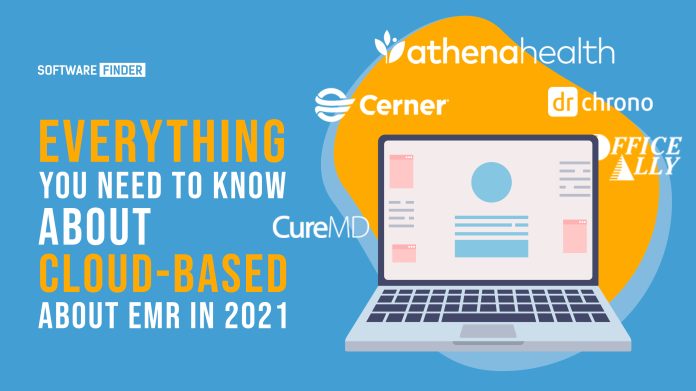
Although EMR software come in all shapes in sizes, there’s one shape that often confuses physicians – Cloud-based EMR software. Even today, many practices don’t go for a cloud-based EMR for fear of data theft or lack of understanding of how cloud-based EMR software work. In this guide, we’ll talk about some of the benefits, types, and misconceptions about cloud-based EMR software in 2021.
In this guide, we’ll talk about:
- Cloud-based EMR vs. On-premise EMR
- Benefits of Cloud-Based EMR
- Misconceptions about Cloud-Based EMR
Cloud-Based EMR vs. On-Premise EMR Software
When developers and designers started thinking of a cloud-based electronic health records (EHR) system, the idea was to improve healthcare dynamics by improving care delivery. While the traditional on-premise systems were useful for large hospitals and practices, they came with many costs that weren’t affordable for small and medium practices. However, the rising government incentives were pushing the use of EHR software in practices.
So in order to provide practices with a cost-effective solution, developers came up with a cloud-based EMR software. This helped bring costs down for implementing an EHR software and gave rise to new features such as easy 24/7 access to patient information, even outside your practice.
Over the years, healthcare information technology (HIT) has come up with new innovations to streamline and simplify user needs to improve productivity and clinical efficiency. Compared to traditional on-premise EHR software, cloud-based EHR software are growing more and more popular because they offer better engagement with little cost. However, some hospitals still need an on-premise EHR due to the nature of their structure, like military hospitals.
One of the key differences between a cloud-based EHR software and an on-premise EHR is data storage. Cloud-based EHR software uses remote servers to store information that can be accessed from anywhere in the world at any time. On the other hand, on-premise EHR software store patient information in your system, and you can only access them when you’re connected to your practice’s network.
Benefits of Cloud-Based EMR Software
Here are the top five benefits of cloud-based EMR software:
- Simpler Implementation:
Compared to on-premise EHR, implementing a cloud-based EHR is simpler. Most of your processes would be running through the internet, so you wouldn’t need to buy and configure hardware or software. With quick implementation, you wouldn’t have to worry much about interrupting cashflows either. - Inexpensive:
With traditional on-premise EHR, you usually have to pay a large amount upfront for their services, which can be a problem for small and medium practices. According to a recent study, it can cost $40,000 or more just to set up an on-premise EHR software. However, with a cloud-based EHR software, you can opt for monthly or yearly subscriptions that cost on average $150-$250 per month per provider. Although there are EHR vendors like AdvancedMD EMR and eClinicalWorks EMR that cost more, they also provide a lot of helpful features as well.
Since you don’t have to buy any designated hardware or software for cloud-based EHR software, implementation is by far inexpensive.
- No Longer Need an IT Team:
On-premise EHR software usually requires a designated IT team to help manage, install, configure, run, test, and update any hardware or software changes. All of that can lead to higher costs and a huge dip in your revenue. With cloud-based EHR, all of that is done by your SaaS provider, and you don’t need to worry about any of it. - Scalable:
Scalability and flexibility are two of the major benefits of a cloud-based EHR software. Rather than the rigidness of on-premise EHR software, cloud-based EHR software offer many helpful tools that support and encourage long-term growth through scalable technologies. In fact, companies like athenahealth EMR even go so far as providing one-on-one support for ensuring long-term growth. - Accessible:
You and your medical staff have 24/7 access to all of your patient records with cloud-based EHR software. It enables better collaboration and improves care coordination. You can seamlessly share patient information with other staff members and physicians and even talk to your patients through secure messages.
Misconceptions about Cloud-Based EMR
Following are some of the common misconceptions about cloud-based EHR software:
Cloud-Based EHR Software have Security Issues:
One of the most common misconceptions about cloud-based EHR software is that they lack security or the cloud’s data isn’t safe. While in the initial phases of cloud technology, this was the case. However, over the years, there have been multiple advancements, including improving safety and security protocols. Today, your information is more at risk on your own system as compared to a cloud storage.
Cloud-Based EHR are One-Size-Fits-All-Solutions:
Cloud-based EHR solutions are highly scalable and flexible. They can shrink down to fit the requirement of independent practices and scale up to meet large hospitals’ needs. So this is also false. Cloud-based EHR software are not a ‘one-size-fits-all’ solution.
Cloud-Based EHR Only Reduce Cost, Nothing Else:
While cloud-based EHR software dramatically reduces costs, that’s not the only good thing about them. For instance, they help streamline workflow with quick access to specialty-specific templates, one-click documentation, e-prescription, and many other features. In addition, it also helps collaborate with other physicians and medical staff more proactively.
You can schedule a referral to a specialist while sitting in the Bahamas sipping a margarita.
Read More 5 Security Misconceptions about Cloud-Based EHRs.
Redefine Your Workflows with a Cloud-Based EMR Software
To sum it up, cloud-based EHR software are the future of healthcare IT. While the initial idea was to help physicians save costs, it ended up providing a lot more value than that. For instance, with cloud-based EHR software, you have simplified implementation, 24/7 accessibility, improved scalability at only a fraction of the cost.
However, like many technologies, there are a few misconceptions about cloud-based EMR software as well.








